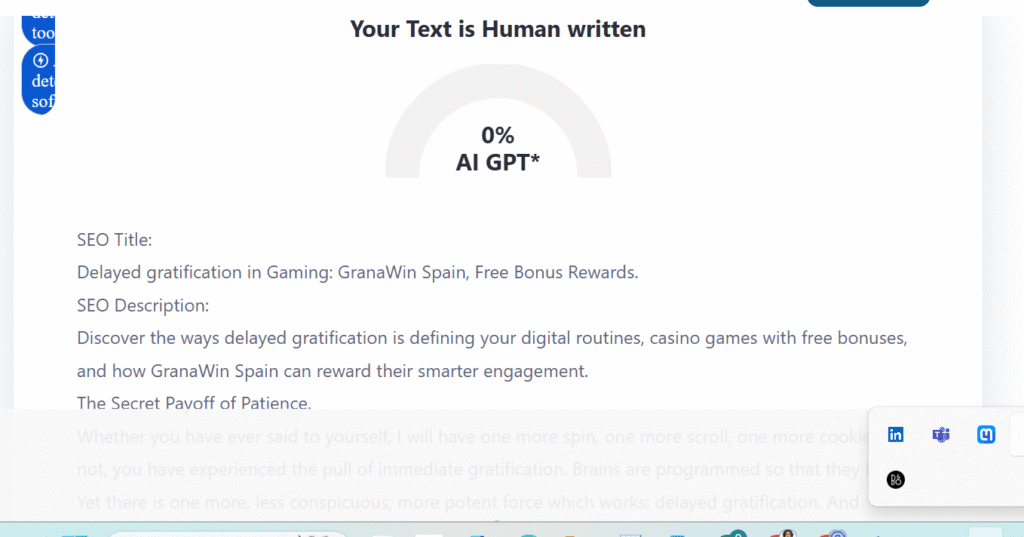
Whether you have ever said to yourself, I will have one more spin, one more scroll, one more cookie, or not, you have experienced the pull of immediate gratification. Brains are programmed to love it. Yet there is one more, less conspicuous, more potent force which works: delayed gratification. And although it is not nearly as exciting as a jackpot or a flash bonus, it is frequently the larger reward, both in life and in our interactions with digital spaces, whether it be social media feeds or casino games with free bonuses.
Psychology of Delayed Gratification.
In the 1970s, researchers conducted a series of experiments, commonly referred to as the marshmallow experiment. Children had a choice between having one marshmallow now or two marshmallows later. The follow-up twenty years later showed that the wait children had a better life outcome – better SAT scores and healthier relationships.
This was not about sugar–this was about self-control. Delayed gratification involves overcoming impulse and balancing between the urge to grab something now and the urge to wait for something bigger in the future.
It is an art that applies anywhere: to save money, not spend a lot, to go to the gym, not to binge-watch, or to avoid the “claim now button, and get a bigger compensation after a month.
The Brain’s Reward System
So why is waiting so hard? Neuroscience has answers.
The dopamine loop: When you expect to receive a reward, your brain releases dopamine–not when you receive the reward, but when you are waiting to receive it. This renders anticipation in itself enjoyable.
Impulse vs. control: The limbic system cries out for immediate gratification, and the prefrontal cortex, the rational CEO of the body, attempts to keep us on track with our long-term objectives.
Cognitive bias: people are inherently biased towards present rewards; that is, we tend to overestimate what is available and present as opposed to what could be available in the future.
That is, patience is not an innate quality, but rather it is a learned one. However, when we discover it, the pleasure we get is better and more enduring.
Everyday Payoffs of Waiting
Delayed gratification manifests itself in forms that we do not necessarily see:
Lesson: It takes effort to learn, rather than learning quickly.
Online interaction: Not giving in to the push notification or autoplay urge of just one more.
In both instances, the short-term loss leads to a payoff in the long term, whether it be monetary stability, physical well-being, or mental rest.
It’s Too Late to Regret in the Digital World.
The online space is designed to addict us to unpredictable payouts: at times, you will receive a massive payout, while other times, you will get nothing, and this uncertainty will make us want to return. It is a mechanism employed by social media algorithms, mobile games, and even casino platforms to maintain user engagement.
However, there is a twist to this, and this is that most systems also reward patience. Imagine waiting to level up a video in a video game, or holding out for a seasonal event or a loyalty bonus. Indeed, studies indicate that the expectation of a reward tends to provide more involvement than the reward itself.
The balance is depicted well through casino platforms. Free bonus casino games often feature waiting mechanics, such as players spinning a dice to receive a quick entertainment payoff. However, more gratifying rewards can be obtained by waiting for a free spin, a tiered loyalty program, or a long-term accumulation of rewards.
An example is Take GranaWin Spain. It has established a reputation for digital entertainment by incorporating delayed gratification into its design. Admittedly, there are fast-paced ones that will keep players glued to the game, but it is the long-term rewards that are truly interesting. It is similar to a good novel in that it leaves readers guessing at every turn about the next chapter without revealing the story at the beginning of the novel.
Professional Tests: Reasons why Waiting is Good.
Psychologists note that one way to become resilient to decision fatigue is to learn to delay gratification. Rather than making tens of tiny impulsive decisions, waiting people save willpower to do more important things.
Economists would present it as a compounding phenomenon: minor sacrifices today would give huge payoffs in the future. The math is on the side of patience, whether it is saving accounts, fitness programs or loyalty programs.
Another aspect highlighted by gaming experts is that delayed gratification promotes healthier digital interaction. Platforms that provide a balance of instant and delayed rewards keep players enjoying themselves without burnout, rather than generating a continuous dopamine spike (and causing it).
Simply put, it is not just a matter of willpower, but creating experiences in life and entertainment to enjoy the waiting process and receive great rewards when the moment comes.

